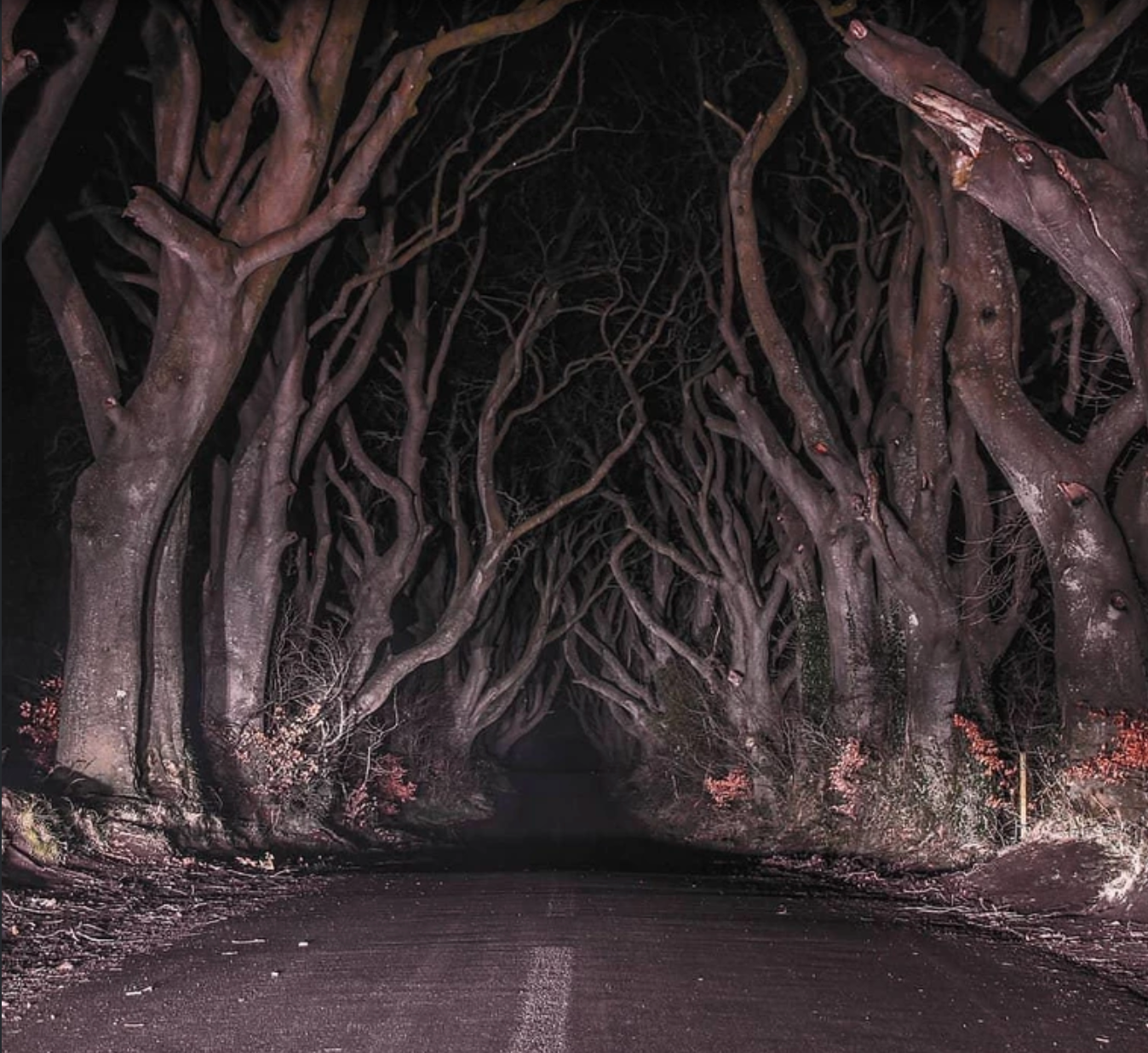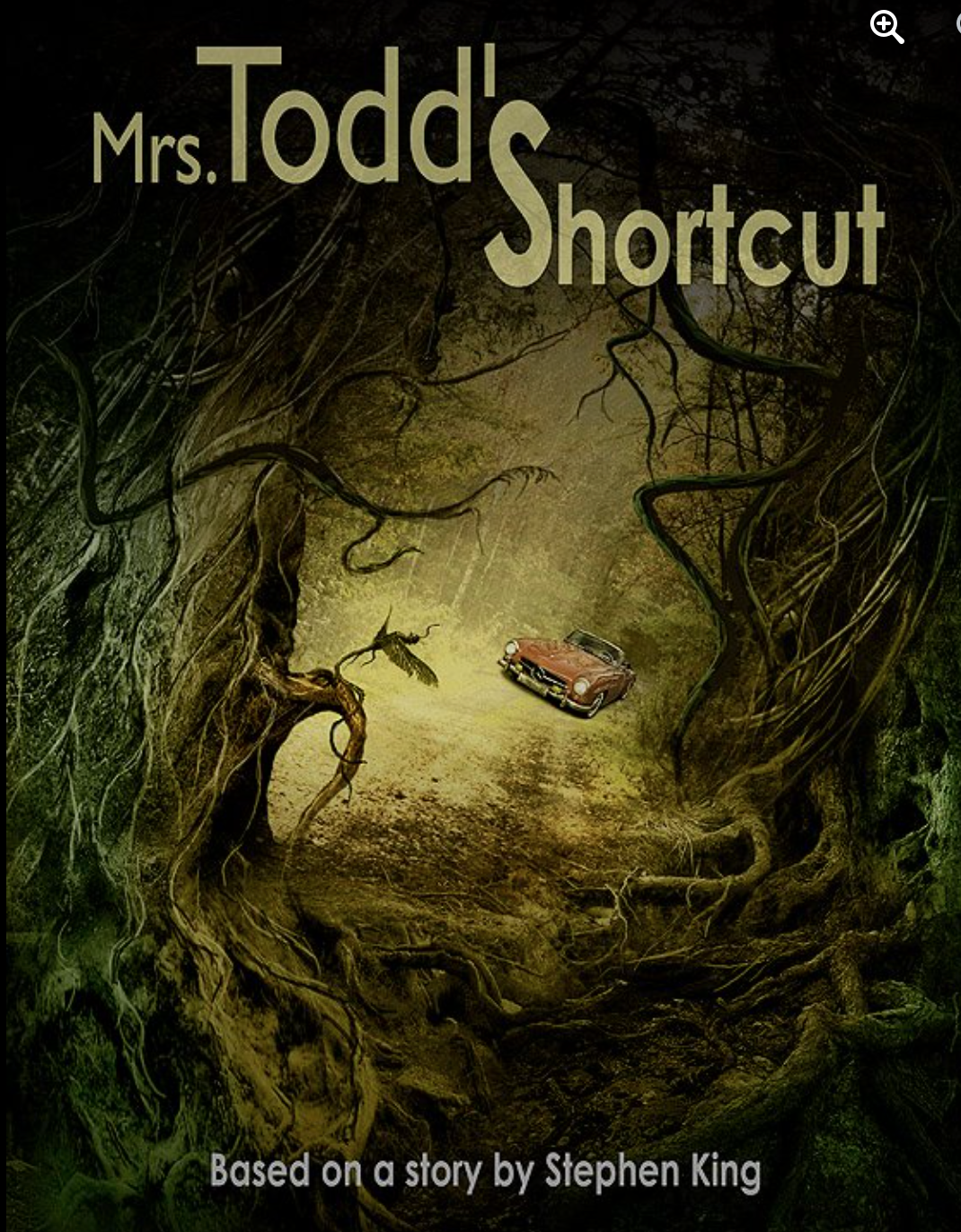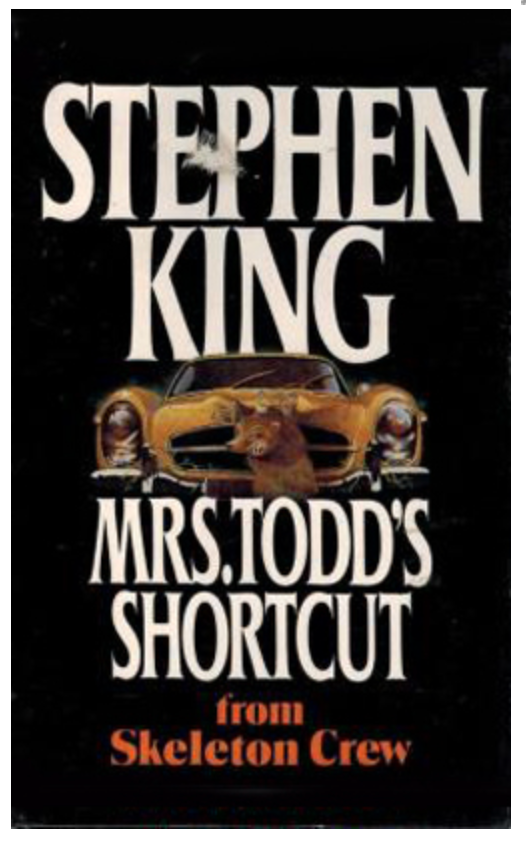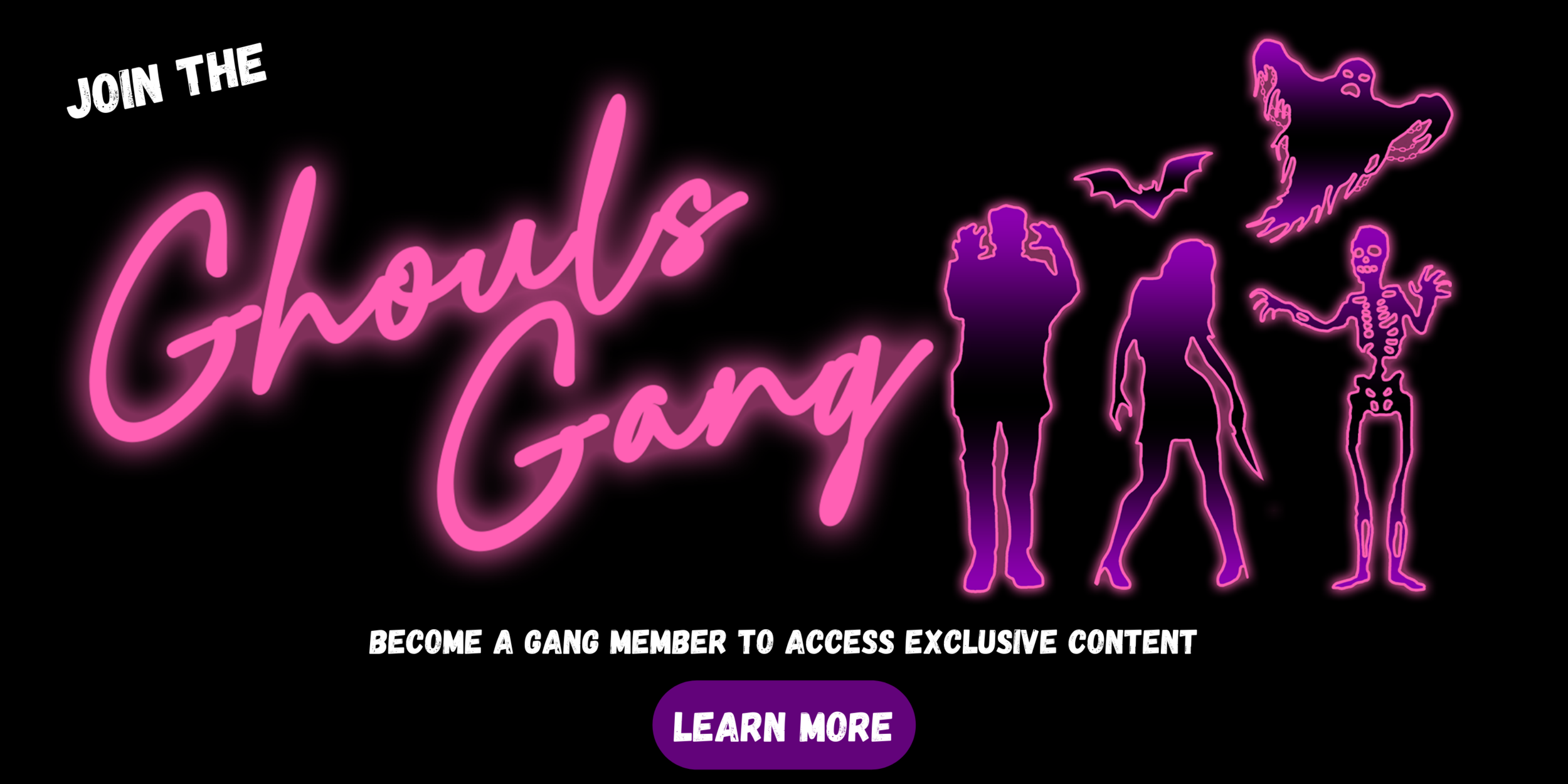[Editorial] I’m Your No.1 Fan: Mrs. Todd’s Shortcut and the Road to Empowerment
“A woman wants to drive.”
I’ve taken to calling the stretch of books published by Stephen King in the early 90s the “Eclipse Series.” With Gerald’s Game (1992), Dolores Claiborne (1992), Insomnia (1994), and Rose Madder (1995) King explores domestic abuse with a series of inspiring women who fight their way out of unfulfilling and dangerous lives. The unofficial series kicked off in earnest in ‘92, but its seeds can be seen as early as King’s first novel, Carrie (1974). Another early Eclipse story can be found in his 1985 collection Skeleton Crew. “Mrs. Todd’s Shortcut” is an exploration of female empowerment and a fantastical tale of a woman finding her way out of a world that doesn’t make her happy. Mrs. Todd’s life may not be unsafe or abusive, but Ophelia Todd has fallen victim to the limitations of a patriarchal system designed to control her. In finding a shortcut, Mrs. Todd creates her own path. She leaves everything behind and becomes who she was always meant to be, the driver on the road of her own life.
Ophelia Todd is a summer person in Castle Rock, Maine. Along with her husband Worth, she owns a vacation home in the tiny town and frequently drives down from Bangor. Though Ophelia will always be “from away,” she does what she can to integrate herself into the community. She’s generous with her time and money, volunteering for fundraisers, childcare, and various municipal projects. In addition to her philanthropy, Mrs. Todd has a peculiar hobby; she loves to find a good shortcut. With a special odometer in her champagne colored Mercedes she tracks the number of miles it takes her to get from Bangor to Castle Rock and marks every trip down in a little notebook, each time trying to beat her record. Her motto, learned from her father, is, “Save enough miles and soon enough you’ll save time.” And while this is certainly true, Mrs. Todd takes her hobby to the extreme. She travels over unmapped streets, boggy bridges, and run down dirt roads that are little more than trails looking for the quickest way to get from one place to another. Her shortcuts begin to take her through other worlds and her odometer displays impossible numbers. Mrs. Todd eventually disappears on one of these shortcuts, losing her way in our world but finding something else entirely.
Worth Todd doesn’t have much interest in his wife’s hobby and Ophelia doesn’t bother driving fast with him in the car. She describes her various shortcuts while caretaker Homer Buckland makes repairs to their home. As a Castle Rock native, he’s well aware of how long it takes to get from the small Maine town to the state’s capital and is astounded to hear how fast she’s able to make the trip. While he grouts a tub, Ophelia tells Homer about an article from Science Today that captured her attention. In 1923, a man proved it physically impossible to run a mile in less than four minutes. Ophelia is fascinated with this fact because the record, which checks out mathematically, has been broken many times over since the article was published. This proves to Ophelia that, “no blue ribbon is forever.” There is no limit that cannot be broken, no boundary that can’t be breached.
Mrs. Todd is a woman of means. She and her husband own two houses and she’s well-liked by the community. But there’s something missing in her life. She craves adventure. She craves freedom. But most of all, she craves empowerment. When describing why the road calls to her, Ophelia alludes to the limitations that define her:
“When I am going along that road in my little car I am not Ophelia Todd, Worth Todd’s wife who could never carry a child to term, or that woman who tried to write poetry and failed at it, or the woman who sits and takes notes in committee meetings, or anything or anyone else. When I am on that road I am in the heart of myself …”
This is the role society has cast for Ophelia and the way she’s been conditioned to define herself, a list of her worth based on external approval and her relationship to others. But the road gives her a chance to be herself, to go where she wants to go and be who she wants to be. The shortcut she finds is a way to circumvent not a traffic jam, a fallen tree, or an impassable highway, but the narrow path set for women in a patriarchal culture. On the road, Mrs. Todd finds the freedom to cast off everything our world uses to define her and she takes the wheel.
On one occasion, Caretaker Homer Buckland rides along with Mrs. Todd on a shortcut from Castle Rock to Bangor. Along the way he finds himself on fantastical roads with creatures from another world. Menacing branches reach out to grab him, giant toads haunt the squelching bogs, and the forest greenery teems with humanoid faces. Ophelia seems to change along the road as well. She develops a striking and terrible beauty resembling Diana driving the moon across the night sky. She is magnificent in her power and Homer fears her splendor could kill him with a single glance. She becomes one with the wildness of her surroundings and finds an empowerment not available to her in our world.
Homer is in awe of Ophelia and fears the world she inhabits. Like most men, he is not used to seeing a woman claim such unabashed power. As the so-called “fairer sex,” we’re told it’s our place to serve, to accommodate, the defer. Our patriarchal society expects it and shuns or vilifies women who will not play by these rules. But Ophelia takes the wheel with no shame and no apologies. Homer urges her to stay away from her shortcuts worrying that she will succumb to the dangerous creatures along the way. He is simply looking out for her safety, but this caution would leave her stuck in a world that doesn’t make her happy. It would mean fully accepting the limitations that have defined her entire life. The real danger is going through the motions of her ordinary existence. Along the road, Ophelia becomes one of the dangerous creatures and finds that remaining stuck in her unfulfilling life is more terrifying than anything she might encounter on the road.
Homer lives for years after Ophelia’s disappearance. He grows old and sees his life begin to pass him by. Perhaps after watching Ophelia take charge of her own destiny, he knows there could be more in his future than the narrow road to death he’s currently on. Homer joins Ophelia on the road, finding that the world that empowers her benefits him as well. As a man, he has more cultural power by default, but these limitations still place him in a narrow role from which he has little chance to break free. Homer is limited by the same rigid guidelines that oppress Ophelia. Patriarchy is the air we breathe. It is the water we drink, and the streets we travel. It pervades every aspect of our lives. Ophelia is brave enough to explore other possibilities and in the process opens a passageway to empowerment for us all.
In her final conversation to Homer before she disappears, Ophelia describes what she wants out of her life. She appears as a goddess to Homer, but that’s not how she sees herself. Ophelia simply wants to drive. She wants to take the wheel of her life and choose where she goes. Homer may fear her, but she is no threat to him, only to the established norms he’s accepted and internalized. But these limits exist only in our minds. If we can only find the courage to challenge them, we can find our way into a new reality. Most feminists do not want to be all-powerful. We do not want to rule. We do not want to place men in the same rigid boxes we’ve been struggling to escape. We simply want the freedom to choose for ourselves the direction our lives take. Like Ophelia, we want to drive.




![[Editorial] Soho Horror Film Festival: Interview with Aimee Kuge on Cannibal Mukbang](https://images.squarespace-cdn.com/content/v1/5fe76a518d20536a3fbd7246/1701808004722-9M8SZ2UXY52QBQBR4NTI/img20230818_15150780.JPG)
![[Editorial] 10 Films & Events to Catch at Soho Horror Film Fest 2023](https://images.squarespace-cdn.com/content/v1/5fe76a518d20536a3fbd7246/1700819417135-299R7L4P0B676AD3RO1X/Screenshot+2023-11-24+at+09.41.52.png)
![[Editorial] 9 Horror Nintendo Switch Games To Play](https://images.squarespace-cdn.com/content/v1/5fe76a518d20536a3fbd7246/1697214470057-3XZXX8N4LYIMDFWS6Z3P/Screenshot+2023-10-13+at+17.20.13.png)
![[Mother of Fears] Mothering in Silence in A Quiet Place (2018)](https://images.squarespace-cdn.com/content/v1/5fe76a518d20536a3fbd7246/1696445921315-HZJ2DZYQIH6VVWXBO2YL/Screenshot+2023-10-04+at+19.52.29.png)
![[Event Review] Highlights from Mayhem Film Festival 2023](https://images.squarespace-cdn.com/content/v1/5fe76a518d20536a3fbd7246/1697624582491-MPT2VB9RRGU6OG7L6UKL/Mayhem+2023.jpg)
![[Editorial] Mayhem Festival: Interview with Thomas Sainsbury on Loop Track (2023)](https://images.squarespace-cdn.com/content/v1/5fe76a518d20536a3fbd7246/1697186472899-WC4RR0TW7L7LMFEBGPA2/Tom+Sainsbury.jpg)
![[Editorial] Keeping Odd Hours: A Retrospective on Near Dark (1987)](https://images.squarespace-cdn.com/content/v1/5fe76a518d20536a3fbd7246/1696445070868-HU9YIL3QPBCL1GW47R3Z/Screenshot+2023-10-04+at+19.36.53.png)
![[Editorial] 5 Female Focused Horror Book Recommendations](https://images.squarespace-cdn.com/content/v1/5fe76a518d20536a3fbd7246/1696441981361-52EQCTJ7AT2QF1927GM7/919xtm6d3fL._AC_UF894%2C1000_QL80_.jpg)
![[Editorial] What to Watch at This Year's Cine-Excess International Film Festival 2023](https://images.squarespace-cdn.com/content/v1/5fe76a518d20536a3fbd7246/1697213510960-REV43FEOZITBD2W8ZPEE/Screenshot+2023-10-13+at+17.01.15.png)















![[Editorial] Oscar Nominations 2026: Where to stream all the horror picks](https://images.squarespace-cdn.com/content/v1/5fe76a518d20536a3fbd7246/1769113319180-4INRRNMZK4DZLHRSUXX5/rev-1-GRC-TT-0026r_High_Res_JPEG-1024x372.jpeg)
![[Editorial] 9 Best Slashers Released Within 10 Years of Scream (1996)](https://images.squarespace-cdn.com/content/v1/5fe76a518d20536a3fbd7246/1695478839037-LOFHGVM3H6BMSZW7G83M/Screenshot+2023-09-23+at+15.15.11.png)
![[Mother of Fears] Mother Vs. Monster in Silent Hill (2006)](https://images.squarespace-cdn.com/content/v1/5fe76a518d20536a3fbd7246/1695485781119-H6GNP0G3J2TLPAOIABV7/Screenshot+2023-09-23+at+17.11.56.png)
![[Editorial] 9 Terrifying Cerebral Visions in Horror Movies](https://images.squarespace-cdn.com/content/v1/5fe76a518d20536a3fbd7246/1693509801235-X23OL50T1DVGECH0ZJK2/MV5BMjQ0MTg2MjQ4MV5BMl5BanBnXkFtZTgwMTU3NDgxMTI%40._V1_.jpg)
![[Mother of Fears] I Don’t Wanna Be Buried in a Pet Sematary (1989) and (2019)](https://images.squarespace-cdn.com/content/v1/5fe76a518d20536a3fbd7246/1691328766069-QFNAVJOMFZVZ5CLU1RWM/Screenshot+2023-08-06+at+14.23.13.png)
![[Mother of Fears] How I Love to Love Nadine in The Stand (2020)](https://images.squarespace-cdn.com/content/v1/5fe76a518d20536a3fbd7246/1690213172707-TKM9MZXK02EVCIX30M1V/Screenshot+2023-07-24+at+16.29.11.png)

Ahead of the Academy Awards ceremony, Ghouls has rounded up where you can stream all of the 2025 horror releases in the UK and the US from the comfort of your own home.